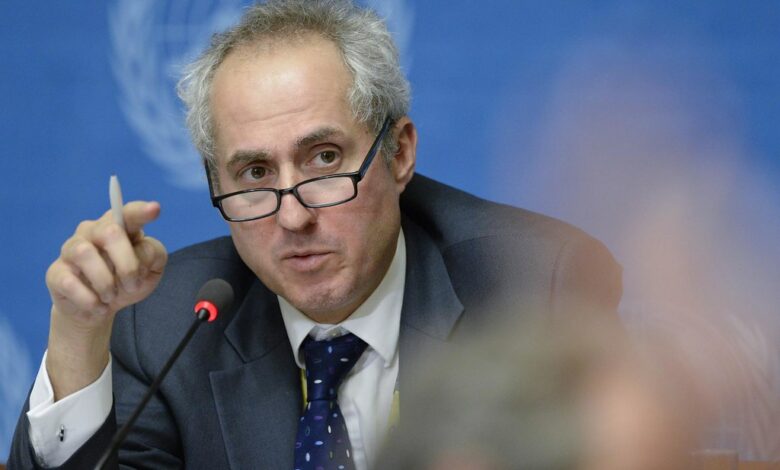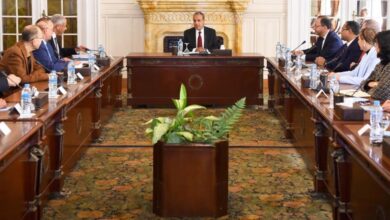
Sitting down for an exclusive interview with Al-Masry Al-Youm at the United Nations headquarters in New York, the spokesperson for the Secretary-General of the United Nations, Stephane Dujarric, said that Egypt plays a vital role in supporting Palestine and resolving the Gaza crisis.
Dujarric also warned of the dangers of Israel’s escalating invasion of the Gaza Strip and urged an end to the war.
As the Gaza Strip faces a collapse of the social system and famine, Dujarric hailed the efforts made by the United Nations Relief and Works Agency for Palestine Refugees (UNRWA) for doing its part to aid those in need there in this critical time.
■To begin with, how do you see Egypt’s role in supporting the Gaza issue?
Egypt plays a vital role in supporting the Palestinian cause in general and resolving the Gaza crisis, especially at this critical time. This was confirmed by the Secretary-General of the United Nations, António Guterres, when he met with President Abdel Fattah al-Sisi during his visit to Egypt at Rafah and Al-Arish.
Egypt is therefore considered an integral part of resolving the Palestinian-Israeli conflict.
■ Due to the long duration of the war, some say that the United Nations has no real role in the current crisis.
This is not true: the United Nations slogan is the best proof of this.
In response to your question, the UN brings together nations with different visions and viewpoints. There are countries that agree and disagree, and we also do not have a single person working on decision-making compared to the Security Council, were any of the five countries can use its veto power.
The United Nations continues to diligently work through its various organizations, even with a lack of consensus and in spite of divisions between countries.
■ So the United Nations is doing its duty?
Yes, this is true, and we are not neglecting any action. This is a complicated matter, and the General Assembly is part of the United Nations doing its duty.
Out of concern over the risk of an Israeli invasion in Palestine’s city of Rafah and calls for forced displacement, the United Nations will not participate – especially since there is no safe place in the Gaza Strip and international law affirms the rights of civilians.
■ What is your real role in stopping the war?
We seek to stop the war on the Gaza Strip, which claimed the lives of a number of our employees, all of whom are of Palestinian origin and work to serve humanity.
We do not have a finger to pull the trigger to stop the war, but we have called and we will continue to call for a ceasefire.
■ What, then, is the solution?
The only way to end the conflict between Palestine and Israel is the two-state solution and returning to negotiations.
■ There are divisions over the role of the the UNRWA. What do you think?
The UNRWA is working to the utmost capability inside Gaza.
The Gaza Strip is a unique area, because we have no authority or control over the entry of food and medical aid into Rafah.
We see that there is a congestion of trucks due to entry procedures and restrictions imposed by Israel.
Let me emphasize that the UNRWA is the backbone for the introduction of food as well as medical and educational aid through its schools, and the humanitarian aid entering Gaza is insufficient to meet the needs of the people of the Strip, and the stock there is not enough for a few days.
■ You talked about the role of the UNRWA. Did you monitor the extent of the destruction of the schools?
There are approximately 26 schools that were completely destroyed, and about 162 academic buildings, representing 30 percent of the schools in the sector. About 175,000 students were studying in all of these destroyed schools, and more than 6,000 teachers worked there.
All of these schools have been subjected to direct bombardments.
Up to 55 percent of schools in Gaza will require either complete reconstruction or major rehabilitation.
■More than once, the United Nations has warned of famine in Gaza.
This is true. You can imagine, and it is a reality, that when aid of all kinds enters the Gaza Strip you find a collapse of the social order.
Because of hunger we see those who, if they get a meal do not know when they will get another meal and so rabidly fight for it, an issue compounded by attacks from outlaws and criminals.
■ Now that there is an escalation in Rafah by Israel, what will happen if the invasion goes through?
We warn against the escalation of the situation in Rafah, and we still demand and call on a ceasefire and thus an end to the war.
However if Israel storms Rafah it will be extremely catastrophic.
■ Are there similarities or differences between the Russian-Ukrainian war and Gaza?
I believe that there is a geopolitical difference between the Russian-Ukrainian war and the war in the Gaza Strip, but what is painful is that it is the civilians who are paying the price – especially women and children.
These victims and their families dream of peace, and I hope that we will see these conflicts stop.
The United Nations will work to implement decisions so that people and the international community can trust international law and the resolutions of the United Nations General Assembly.




